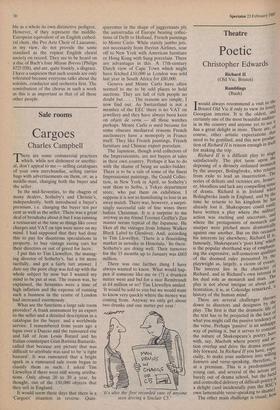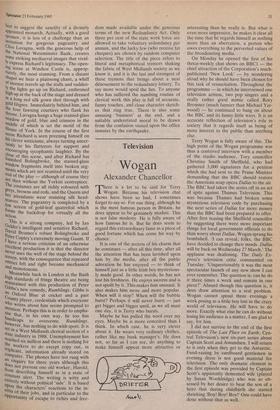Theatre
Poetic
Christopher Edwards
Richard II (Old Vic, Bristol) Rumblings (Bush)
Iwould always recommend a visit to the Bristol Old Vic if only to view its lovely Georgian interior. It is the oldest, and certainly one of the most beautiful auditor- ia in the country and anyone yet to see it has a great delight in store. There are, of course, other artistic expectations that need to be gratified, and this new prodUci; tion of Richard II is reason enough in its° for making the trip. Richard II is a difficult play to stage satisfactorily. The plot turns upon the deposing of a divinely ordained monarch by the usurper, Bolingbroke, who returns from exile to lead an insurrection. The series of defeats and victories are, howev- er, bloodless and lack any compelling sense of drama. Richard is in Ireland when Bolingbroke lands in England, and by We time he returns to his kingdom he 1195 already lost it. Shakespeare could easily have written a play where the militaryd action was exciting and uncertain, a where the protagonists of monarch an usurper were pitched more dramaticnnY against one another. But on this occasion his interests lay elsewhere; Richard I1 .1s, famously, Shakespeare's 'poet king' which is the popular shorthand way of emphas.l- mg the expressive, self-conscious qualities of the doomed ruler presented by the playwright as, largely, a victim of events; The interest lies in the character °I Richard, and in Richard's own interest In his dual role as monarch and man. The play is not about intrigue or about cos: frontation; it is, as Coleridge remarked, a history of the human mind'. There are several challenges thrt3gr, down to directors and designers by W..; play. The first is that the dramatic life 01; the text has to be projected in the face 01, what you might call the passive tendency °I the verse. Perhaps 'passive' is an unhaPPY way of putting it, but it serves to contrast the nature of Shakespeare's poetry here with, say, Macbeth where poetry and at on overlap and drive the drama irresist b : ibly forward. In Richard II you have, espe- cially, to make your audience into w111113.g, listeners and verse-speaking, therefore, at a premium. This is a predominanq young cast, and several of the actors at.', barely out of drama school, but the lucid and controlled delivery of difficult poetrY!' a delight (and incidentally puts the RSC 5 own lamentable verse-speaking to shame); The other main challenge is visual; b° best to suggest the sanctity of a divinely appointed monarch. Actually, with a good sponsor, it is less of a challenge than an invitation for gorgeous pageantry and Clive Lavagna, with the generous help of the National Westminster Bank, creates some me striking mediaeval images that vivid- iY express Richard's legitimacy. The open- ing scene at Windsor Castle is, approp- riately, the most stunning. From a distant chapel we hear a plainsong chant, a whiff of incense travels up the stalls and sudden- ly the lights go up on Richard, enthroned high up at the back of the stage and dressed In a long red silk gown shot through with gold filigree. Immediately behind him, and the four fawning courtiers who flank his throne, Lavagna hangs a huge stained-glass Window of gold, blue and crimson in the middle of which is set the motif of the House of York. In the course of the first scene Richard is seen preening himself on his clever witticisms, always turning uncer- tainly to his flatterers for support and encouraging sycophantic laughter. By the close of this scene, and after Richard has banished Bolingbroke, the stained-glass window fragments itself into broken seg- ments which are not reunited until the very end of the play — although of course they are then without the Yorkist centrepiece. The costumes are all richly coloured with greys, browns and reds, and the Queen and her attendants wear stunning silk head- carves. The pageantry is completed by a 'Ow screen of gold-leaf quatrefoil which forms the backdrop for virtually all the
action.
This is a strong company, led by Ian Gelder's intelligent and sensitive Richard, David Beames's robust Bolingbroke and .reter Copley's extremely moving Gaunt. If 1 have a serious criticism of an otherwise excellent production it is that the director never uses the well of the stage behind the screen, with the consequence that repeated entries left and right become mechanical and monotonous. Meanwhile back in London at the Bush high standards of fringe theatre are being Maintained with this production of Peter Gibbs's new comedy, Rumblings. Gibbs is an Oxford Blue at cricket and a past County player, credentials which everyone who writes about him seems prompted to Mention. Perhaps this is in order to empha- sise that, in his own way, he too has handicaps to overcome. Rumblings, however, has nothing to do with sport. It is set M a West Midlands clerical section of a state industry in 1988. Unemployment has reached six million and there is nothing for the workers to do except copy out, in triplicate, information already stored on computer. The phones have not rung with an enquiry for three years although this does not prevent one old worker, Harold, from describing himself as in a state of Constant alert. The writing is witty and entirely without political 'side'. It is based upon the characters' reactions to the in- ertia of their jobs, and in particular to the °PPortunity of escape to riches and free- dom made available under the generous terms of the new Redundancy Act. Only three per cent of the state work force are allowed to take voluntary redundancy per annum, and the lucky few (who receive fat cheques) are chosen by random computer selection. The title of the piece refers to literal and metaphorical tremors shaking the fabric of West Midlands society as we know it, and it is the last and strongest of these tremors that brings about a neat denouement to the redundancy lottery. To say more would spoil the fun. To anyone who has suffered the numbing routine of clerical work this play is full of accurate, funny touches, and close character sketch- es that ring true. There is also some amusing 'business' at the end, and a suitably understated moral to be drawn from the confusion visited upon the office inmates by the earthquake.











































 Previous page
Previous page